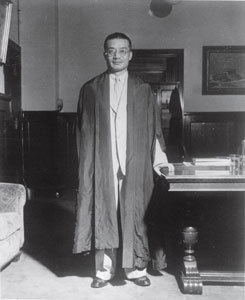Chinese Judge Mei Ru'ao at the 1946 Tokyo trial
- By Ma Yujia
 0 Comment(s)
0 Comment(s) Print
Print E-mail China.org.cn, August 26, 2015
E-mail China.org.cn, August 26, 2015
Mei Ru'ao was a legend. He will be remembered for the efforts he made to protect the dignity and legal interests of Chinese people during the process of trying 28 Japanese war criminals at the Tokyo trial court.
 |
|
Chinese Judge Mei Ru'ao at the 1946 Tokyo trial |
"I don't want revenge. I have no intention to settle the blood debt committed by the Japanese military with the Japanese people. However, I believe that forgetting the sufferings of the past may cause a calamity in the future," he wrote in his book, which talks about the history of the Nanjing Massacre.
Mei Ru'ao was born in a remote village near Nanchang city, south China's Jiangxi Province in 1904. At 24, he received his doctoral degree from the University of Chicago in law.
In 1929, Mei went back to China after finishing study abroad. From then until 1946, he devoted himself to teaching theory of law in universities. He also involved in lots of work on amending laws for the then Chinese government.
Chosen as a Chinese judge
In 1945, the International Military Tribunal for the Far East (IMTFE) was established by the Allies after World War II. In 1946, the tribunal convened 11 justices from 11 countries and Mei Ru'ao was appointed as the Chinese judge at the age of 42. When he knew that the other judges were older than him, Mei decided to grow a beard to make him look more serious and mature.
The Tokyo trial lasted for about two and a half years until November 1948. The Chinese delegation, headed by Mei Ru'ao, made important contributions to the smooth progress of the trial with hard work and great care.
The seating order of the judges in court
On March 20, 1946, Mei Ru'ao took the flight to Japan and started to perform the duty officially.
At the trial rehearsal, Australian judge Dr William, the president of the court, arranged the seating of the judges in the following order: the United States, Britain, China, the Soviet Union, Canada, France, Australia, the Netherlands, lndia, New Zealand, and the Philippines.
Mei said he would not accept that arrangement. He believed the seating order of the judges in this trial should follow the order of signatures on the Japanese Instrument of Surrender. China was second on the list. Therefore, the judge from China should be seated right after the United States.
"In this war against Japanese aggression, China has suffered the most and fought the longest and the hardest. Britain, on the other hand, has been retreating and surrendering time and time again. It's unthinkable that China's place in this trial should be relegated to a spot below Britain," Mei said, "If I agree to this arrangement, I will be insulting my country. I'd be insulting all my countrymen's suffering, sacrifice and perseverance in resisting the Japanese aggression. Everything."
Dr William eventually agreed with Mei and arranged the seating order according to the order of signatures.
The measurement of the penalty
When the trial entered into the final stage, the measurement of the penalty was disputed among the judges. Mei Ru'ao insisted on applying stern sanctions towards Japanese criminals while some judges doubted whether to sentence them to death.
He looked over numerous official materials and submitted strong evidence to prove that the invading Japanese troops committed amount of crimes against humanity, like slaughtering, burying people alive, and burning and raping women.
"If neither Japan nor the war criminals receive the severest punishment, who can be sure that they will never wage war again? Who can be sure that Japan will never invade other countries? Who can be sure that the Japanese militaristic spirit will never reappear? We can vote now for all those who died in the war...for closing eyes in death. Think it over," Mei said to the other judges in court.
Finally, some judges were convinced and seven defendants including Hideki Tojo, Kenji Doihara and Koki Hirota were sentenced to death by hanging, and another sixteen defendants were sentenced to life imprisonment.
"To this day, l can't think about what would happen to all the Chinese people and the whole world if on that morning, if the result had been different? All the judges had pledged at the beginning that we would never disclose who agreed with the death sentence and who did not agree, what l want to say was that l tried my best," Mei said.
After the trial finished, Mei Ru'ao was appointed as Justice Minister by the Kuomintang government. However, because he was deeply disappointed with the government, he refused to assume office. Till the end of 1949, when the New China was founded, Mei Ru'ao came back to Beijing and was appointed as the consultant of the Foreign Ministry by the government of the People's Republic of China.
In 1973, Mei died at the age of 69 in Beijing.






Go to Forum >>0 Comment(s)